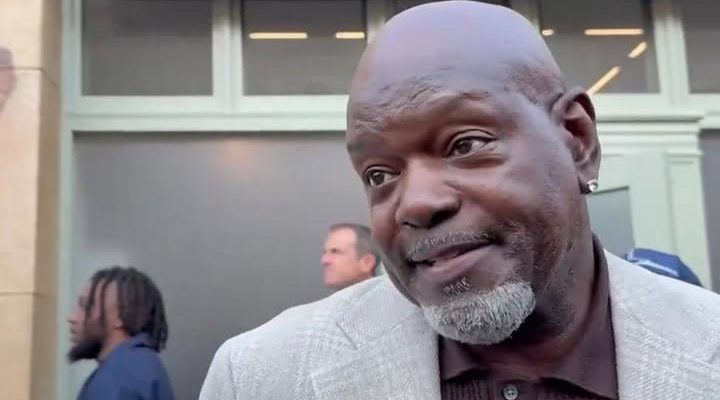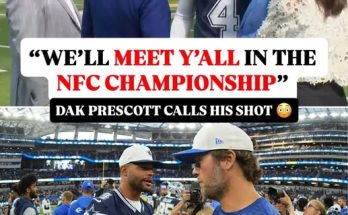Emmitt Smith, the legendary Dallas Cowboys running back and the NFL’s all-time leading rusher, recently opened up with a candid reflection on the team’s Super Bowl successes in the 1990s and the ongoing championship drought since then. His words offer a clear perspective on the dynamics between ownership, management, and player responsibility that shaped one of the most dominant dynasties in NFL history. Smith’s comments also underscore the evolving challenges facing the Cowboys today, inviting a deeper look into what made that era so successful and why the team has struggled to replicate that glory in recent decades.
Jerry Jones, the charismatic and sometimes controversial owner of the Dallas Cowboys, has been a towering figure in the NFL since he bought the franchise in 1989. His impact on the business side of the team and the league at large is undeniable. Jones revolutionized how NFL franchises are marketed and monetized, transforming the Cowboys into arguably the most valuable and widely recognized sports franchise in the world. But when it comes to on-field success, Smith’s remarks highlight an important distinction — the owner’s role is far removed from the players’ execution and accountability on game day. “Jerry never caught a pass, never ran a ball, and he damn sure didn’t throw it,” Smith said, emphasizing that the actual victories come from the players’ hands and feet, not the owner’s office.
During the Cowboys’ 1990s dynasty, Dallas won three Super Bowls in four years — 1992, 1993, and 1995 — an era marked by incredible talent, relentless work ethic, and a cohesive team culture. The roster boasted Hall of Famers like Troy Aikman, Emmitt Smith himself, and Michael Irvin, who formed the core of a dynamic offense. Alongside them, a sturdy defense and solid special teams completed the well-rounded team. But beyond individual talent, Smith points to the mindset the players adopted. “At some point, players have to take on ownership of what they’ve been trained and taught to do,” he said. This statement cuts to the heart of what made the Cowboys so formidable — players internalized responsibility, held each other accountable, and operated with a shared mission to win.
This attitude of player ownership was critical, especially in a franchise as high-profile as Dallas, where media scrutiny and fan expectations can be overwhelming. The 1990s Cowboys players seemed to thrive under pressure, channeling it into focus and determination. The culture cultivated on the practice fields and in the locker room was one where excuses were rejected, and preparation was sacrosanct. Players studied film, conditioned their bodies, and developed chemistry with teammates, knowing that every detail mattered. It was a collective effort that went far beyond the strategies drawn up by coaches or the decisions made by ownership.
Jones, for his part, played an essential role in building the framework for that success. His aggressive approach to assembling talent, his willingness to spend on free agents, and his hands-on involvement in personnel decisions helped create the foundation. He famously fired longtime coach Tom Landry shortly after purchasing the team and hired Jimmy Johnson, a move that initially shocked the NFL but eventually led to championship glory. Jones’ vision and business acumen made it possible to assemble the pieces, but as Smith’s comments imply, the final results depended on players executing their roles at the highest level.
The Cowboys’ post-1990s history, however, has been marked by frustration and unmet expectations. Despite multiple playoff appearances, the franchise has not reached the Super Bowl since the 1995 season. Various factors contribute to this drought — coaching changes, injuries, inconsistent quarterback play, and shifting team dynamics all play a part. Yet Smith’s words suggest that, at the core, the challenge remains one of internal accountability and culture. Without players fully embracing ownership of their roles and performances, it becomes difficult to recapture the dominance of the past.
In recent years, the Cowboys have showcased promising talent, including stars like Dak Prescott, Ezekiel Elliott, and Micah Parsons, players who have the skill to lead Dallas back to championship contention. But the question lingers: will the team develop the same mindset of collective ownership and unyielding commitment that defined the dynasty? Smith’s insight offers a blueprint. It’s not enough to have talent or ownership backing; players must be willing to own the process, hold each other accountable, and foster a culture where winning is the ultimate standard.
Smith’s reflection also reminds us that winning a Super Bowl is an incredibly complex feat. It requires alignment across all levels — from ownership to front office, coaching staff, and players. Each group has its role, and success depends on how well those roles synchronize. While Jones’ role as owner is vital in setting the tone and providing resources, the players are the ones who physically compete, make split-second decisions, and ultimately determine outcomes on the field.
Moreover, Smith’s candid remarks can be viewed as a challenge and a call to action for today’s Cowboys. They emphasize that while external factors matter, the internal culture and player mentality are just as crucial. Building a winning team isn’t simply about signing high-profile free agents or making flashy trades; it’s about cultivating a shared belief, trust, and commitment to excellence every single day.
The Cowboys’ fans, known for their passion and patience, understand the hunger for a return to glory. The franchise’s history is rich with iconic moments and legendary figures, and Smith’s comments serve as a bridge connecting the past to the present. They encourage reflection on what worked before and how those lessons can guide the team moving forward.
In the end, Emmitt Smith’s perspective on Jerry Jones’ role and the player-driven nature of success highlights a fundamental truth in sports: while leadership from ownership and management sets the stage, it is the players who must step up and claim responsibility for their destiny. The Dallas Cowboys’ 1990s dynasty wasn’t built on one person’s effort but on the collective will and ownership of a group determined to be champions. For the Cowboys to end their Super Bowl drought, rekindling that spirit of ownership and unity may be the key.
Smith’s remarks offer not just a reflection on the past but a roadmap for the future. As the Cowboys continue their pursuit of excellence, they would do well to remember that at the heart of every championship team lies a core of players who take full ownership — of their training, their teamwork, and their shared goal of winning. Only then can the franchise hope to reclaim the throne it once held so dominantly and give the fans the championship celebrations they long for.
The legacy of the 1990s Cowboys is a testament to what can happen when talent meets accountability. It is a reminder that while an owner like Jerry Jones can create opportunity, the players must embrace responsibility to seize it. As Emmitt Smith so eloquently put it, the ball is ultimately in the players’ hands — and only by owning that can they hope to write the next great chapter in Cowboys history.



